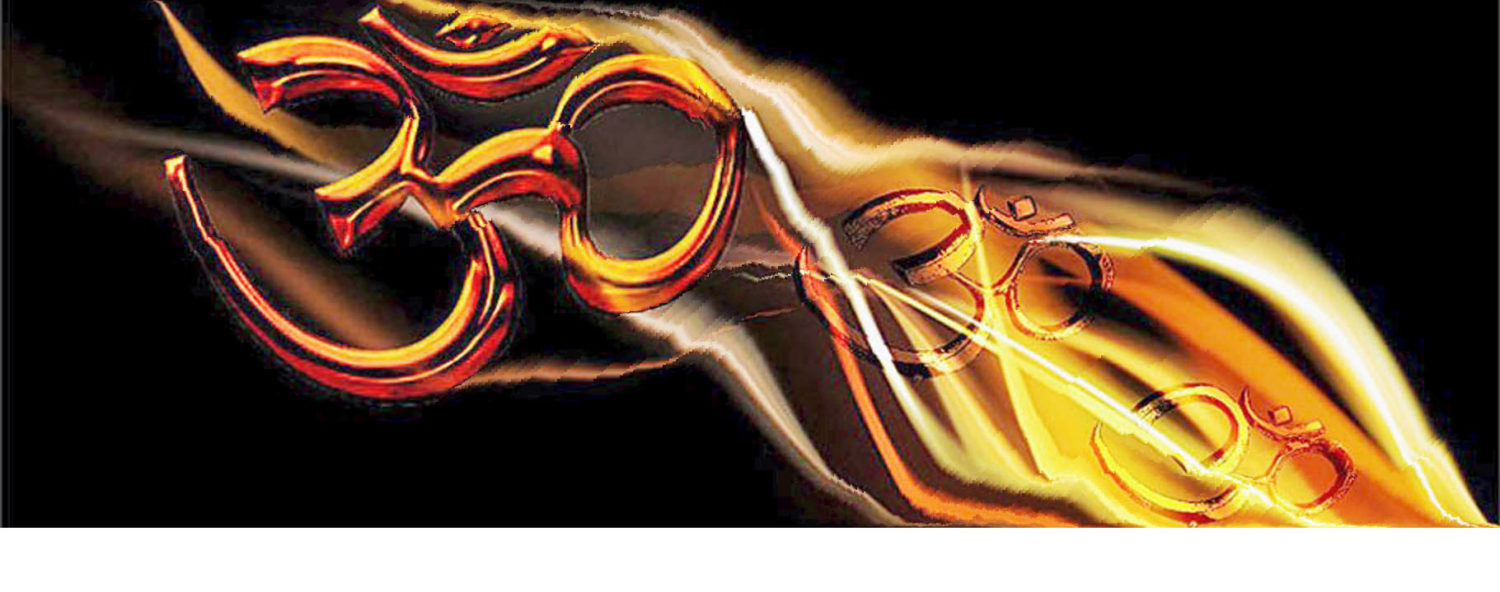All actions will go on by themselves
D: Bhagavan said yesterday that while one is engaged in search of God ‘within’, ‘outer’ work would go on automatically. In the life of Sri Chaitanya it is said that during his lectures to students he was really seeking Krishna (Self) within, forgot all about his body and went on talking of Krishna only. This raises a doubt whether work can safely be left to itself. Should one keep part-attention on the physical work?
M: The Self is all. Are you apart from the Self? Or can the work go on without the Self? The Self is universal: so, all actions will go on whether you strain yourself to be engaged in them or not. The work will go on of itself. Thus Krishna told Arjuna that he need not trouble to kill the Kauravas; they were already slain by God. It was not for him to resolve to work and worry himself about it, but to allow his own nature to carry out the will of the higher power.
D: But the work may suffer if I do not attend to it.
M: Attending to the Self means attending to the work. Because you identify yourself with the body, you think that work is done by you. But the body and its activities, including that work, are not apart from the Self. What does it matter whether you attend to the work or not? Suppose you walk from one place to another: you do not attend to the steps you take. Yet you find yourself after a time at your goal. You see how the business of walking goes on without your attending to it. So also with other kinds of work.
D: It is then like sleep-walking.
M: Like somnambulism? Quite so. When a child is fast asleep, his mother feeds him; the child eats the food just as well as when he is fully awake. But the next morning he says to the mother, “Mother, I did not take food last night”. The mother and others know that he did, but he says that he did not; he was not aware. Still the action had gone on.
A traveller in a cart has fallen asleep. The bulls move, stand still or are unyoked during the journey. He does not know these events but finds himself in a different place after he wakes up. He has been blissfully ignorant of the occurrences on the way, but the journey has been finished. Similarly with the Self of a person. The ever-wakeful Self is compared to the traveller asleep in the cart. The waking state is the moving of the bulls; samadhi is their standing still (because samadhi means jagrat- sushupti, that is to say, the person is aware but not concerned in the action; the bulls are yoked but do not move); sleep is the unyoking of the bulls, for there is complete stopping of activity corresponding to the relief of the bulls from the yoke.
Or again, take the instance of the cinema. Scenes are projected on the screen in the cinema-show. But the moving pictures do not affect or alter the screen. The spectator pays attention to them, not to the screen. They cannot exist apart from the screen, yet the screen is ignored. So also, the Self is the screen where the pictures, activities etc. are seen going on. The man is aware of the latter but not aware of the essential former. All the same the world of pictures is not apart from the Self. Whether he is aware of the screen or unaware, the actions will continue.
D: But there is an operator in the cinema!
M: The cinema-show is made out of insentient materials. The lamp, the pictures, the screen etc., are all insentient and so they need an operator, the sentient agent. On the other hand, the Self is absolute consciousness, and therefore self-contained. There cannot be an operator apart from the Self.
D: I am not confusing the body with the operator; rather, I am referring to Krishna’s words in the 61st verse, Chapter XVIII of the Gita.
“The Lord, O Arjuna, dwells in the Heart of every being, and He by His delusive power spins round all beings set as if on a machine”.
M: The functions of the body involving the need for an operator, are borne in mind; since the body is jada or insentient, a sentient operator is necessary. Because people think that they are jivas, Krishna said that God resides in the heart as the operator of the jivas. In fact, there are no jivas and no operator, as it were, outside them; the Self comprises all. It is the screen, the pictures, the seer, the actors, the operator, the light, the theatre and all else. Your confounding the Self with the body and imagining yourself the actor, is like the seer representing himself as an actor in the cinema-show. Imagine the actor asking if he can enact a scene without the screen ! Such is the case of the man who thinks of his actions apart from the Self.
D: On the other hand, it is like asking the spectator to act in the cinema-picture. So, we must learn sleep-waking!
M: Actions and states are according to one’s point of view. A crow, an elephant, a snake, each makes use of one limb for two alternate purposes. With one eye the crow looks on either side; for the elephant the trunk serves the purpose of both a hand and a nose, and the serpent sees as well as hears with its eyes. Whether you say the crow has an eye or eyes, or refer to the trunk of the elephant as ‘hand’ or ‘nose’ or call the eyes of the serpent its ears, it means all the same. Similarly in the case of the jnani, sleep-waking or waking-sleep or dream-sleep or dreaming-wakefulness, are all much the same thing.
D: But we have to deal with a physical body in a physical, waking world! If we sleep while work is going on, or try to work while asleep, the work will go wrong.
M: Sleep is not ignorance, it is one’s pure state; wakefulness is not knowledge, it is ignorance. There is full awareness in sleep and total ignorance in waking. Your real nature covers both and extends beyond. The Self is beyond both knowledge and ignorance. Sleep, dream and waking states are only modes passing before the Self: they proceed whether you are aware of them or not. That is the state of the jnani, in whom pass the states of samadhi, waking, dream and deep sleep, like the bulls moving, standing, or being unyoked, while the passenger is asleep. These answers are from the point of view of the ajnani; otherwise such questions would not arise.
D: Of course, they cannot arise for the Self. Who would be there to ask? But unfortunately, I have not yet realised the Self!
M: That is just the obstacle in your way. You must get rid of the idea that you are an ajnani and have yet to realise the Self. You are the Self. Was there ever a time when you were not aware of that Self?
D: So, we must experiment in sleep-waking ….. or in day-dreaming?
M: (Laughs).
D: I maintain that the physical body of the man immersed in samadhi as a result of the unbroken ‘contemplation’2 of the Self, may become motionless for that reason. It may be active or inactive. The mind established in such ‘contemplation’ will not be affected by the movements of the body or the senses; nor is disturbance of the mind the forerunner of physical activity. Whereas another person asserts that physical activity certainly prevents samadhi or unbroken ‘contemplation’. What is Bhagavan’s opinion? You are the abiding proof of my statement.
M: Both of you are right: you refer to sahaja nirvikalpa samadhi and the other refers to kevala nirvikalpa samadhi. In the latter case the mind lies immersed in the light of the Self (whereas, the mind lies in the darkness of ignorance in deep sleep); and the subject makes a distinction between samadhi and activity after waking up from samadhi. Moreover, activity of the body, of the sight, of the vital forces and of the mind and the cognisance of objects, all these are obstructions for one who seeks to realise kevala nirvikalpa samadhi.
In sahaja samadhi, however, the mind has resolved into the Self and has been lost. The differences and obstructions mentioned above do not, therefore, exist here. The activities of such a being are like the feeding of a somnolent boy, perceptible to the onlooker but not to the subject. The traveller sleeping in the moving cart is not aware of the motion of the cart, because his mind is sunk in darkness. Whereas, the sahaja jnani remains unaware of his bodily activities because his mind is dead, having been resolved into the ecstasy of chidananda (bliss of the Self).
Note: The distinction between sleep, kevala nirvikalpa samadhi and sahaja nirvikalpa samadhi can be clearly put in a tabular form as given by Sri Bhagavan:
[table caption=”Bhagavan’s Elucidation” width=”750px” colwith=”100px|350px|350px”]
Sleep^Kevala Nirvikalpa Samadhi^Sahaja Nirvikalpa Samadhi
Mind Alive^Mind Alive^Mind Dead
Sunk in Oblivion^Sunk in Light^Resolved into the Self
^Like a bucket tied to a rope and left lying in the water in a well^Like a river discharged into the ocean and its identity lost
^To be drawn out by the other end of the rope^ A river cannot be redirected from the ocean
[/table]
The mind of the Sage who has realized the Self is wholly destroyed. It is dead. But to the onlooker, he may seem to possess a mind just like the layman. Hence the ‘I’ in the Sage has merely an apparent ‘objective reality’. In fact however, it has neither a subjective existence nor an objective reality.
2 The word, contemplation, is often used loosely as referring to a forced mental process, whereas samadhi lies beyond effort. However, in the language of Christian mysticism “contemplation” is the synonym invariably used for samadhi, and it is in this sense the word is used above.
Maharshi’s Gospel
Work and Renunciation





